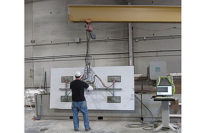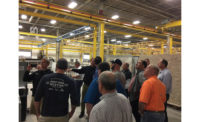Dan Riccolo, Morris Granite, Morris, IL:We utilize a water treatment system. Also, we use gray water for cooling diamond tooling when appropriate. Our scraps are crushed and used for road base underlayment. The heat from the compressor is captured and used to help heat the workshop when required. Cans and paper are recycled through a city program, and grass clippings are mulched back into the yard.
Our diesel trucks get excellent mileage, and they burn only the ultra-low sulphur diesel fuel for a cleaner burn and less pollution.
Unfortunately, we do not convey this type of information to our clients — yet. This discussion certainly has made me realize that we do a great deal involving the green movement than I initially realized. I think we can use this to our sales advantage.
Mike Dean, SFA, The Top Shop Inc., London, Ontario, Canada:We have a water treatment system to conserve fresh water use and discharge, and we also collect rainwater to top up the system because of evaporation. We crush scrap stone for use around the shop on the property, and we also give scrap to the local crusher for use in asphalt. We have a recycling program with our local waste collector for paper, plastics and cans.
In the office areas, we utilize some automatic lighting to conserve energy.
We have two Smart Cars for our measuring team to travel in. Our company tries to focus on these things. Not only are they good for everyone; they can save money too.
Carmine Pantano, Frank’s Marble & Granite, Red Lion, PA:We recycle our water in a closed-loop system, so there is no discharge in the sewer or ground.
All our stone scrap is put in a separate dumpster that gets used by different people. It mostly gets used for clean fill for a local developer, but we also have a few local sculptors that used the scrap to build a Veterans Memorial Wall around a statue they made a few years ago. Another local artist makes candles out of the scrap and sells them at flea markets. Some customers come back to get the scrap to use as pavers, stepping stones, etc. for small home projects.
We also recycle all our aluminum cans, water bottles, paper, etc.
When we walk our customers through our shop, we explain the water treatment system, and they usually are very impressed by that. That usually leads to, “What do you do with the scrap stone?” We then explain what we do with that as mentioned above. I feel that is a great part of the tour as we take the customer through our shop. It has impressed a few teachers that we even get tours by local technical schools that ask us to emphasize the green aspect of our manufacturing process.
Joey Marcella, Mario & Son, Inc., Liberty Lake, WA:Our shop utilizes all the common green solutions, such as closed-loop water recycling, separating recyclable trash, using sensors for lighting, variable-speed compressor and so on.
Although we convey this information to many of our customers, the idea that we utilize green practices seems to make little difference in our price-driven market.
In the end, however, we feel better about not sending thousands of gallons of water down the drain, and overall, doing what we can for our planet.
There are savings that are realized through these practices as well, but under the constant pressure of downward pricing and the ever-increasing cost of doing business, these savings are generally absorbed back into the operation and not passed on to the consumer.



